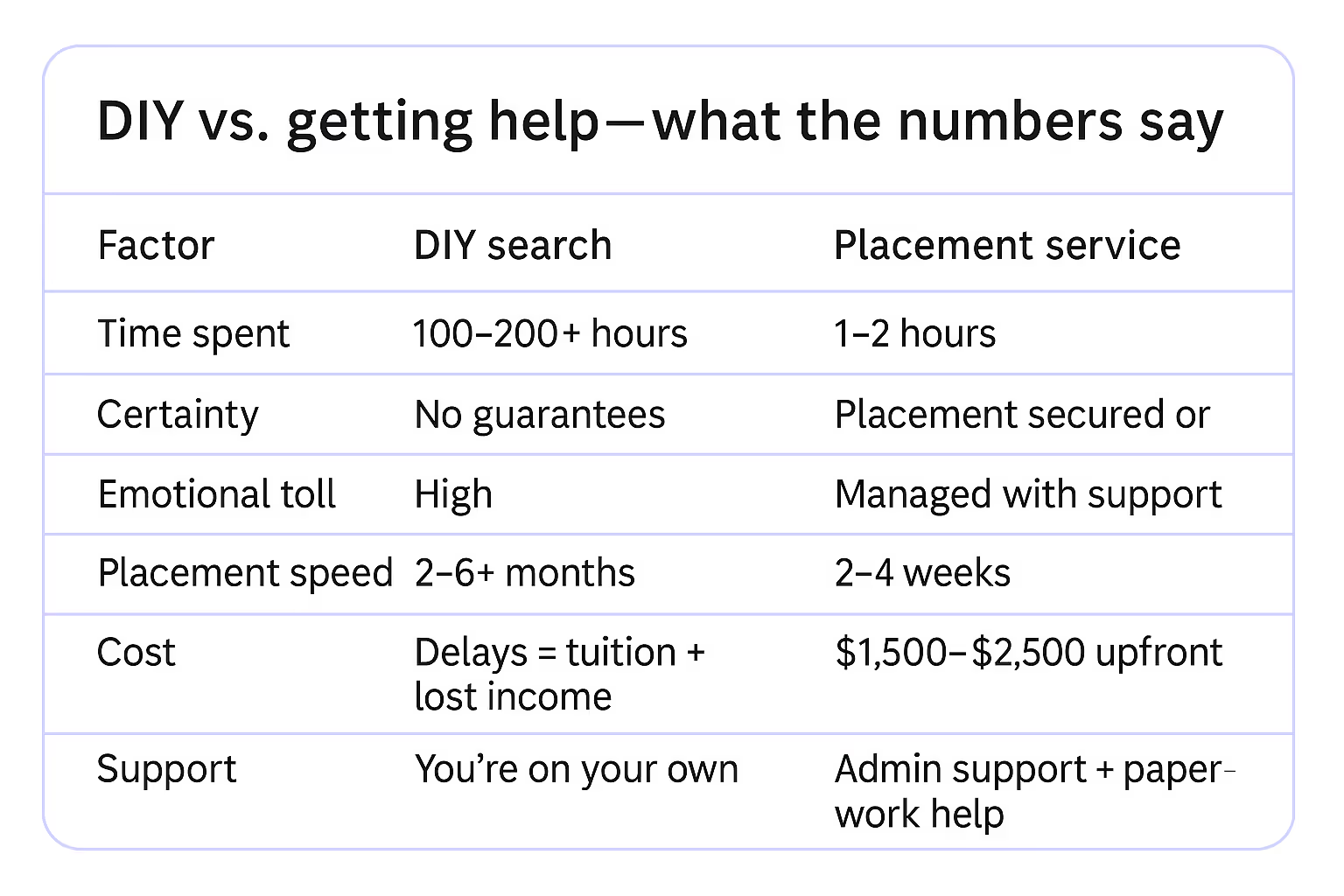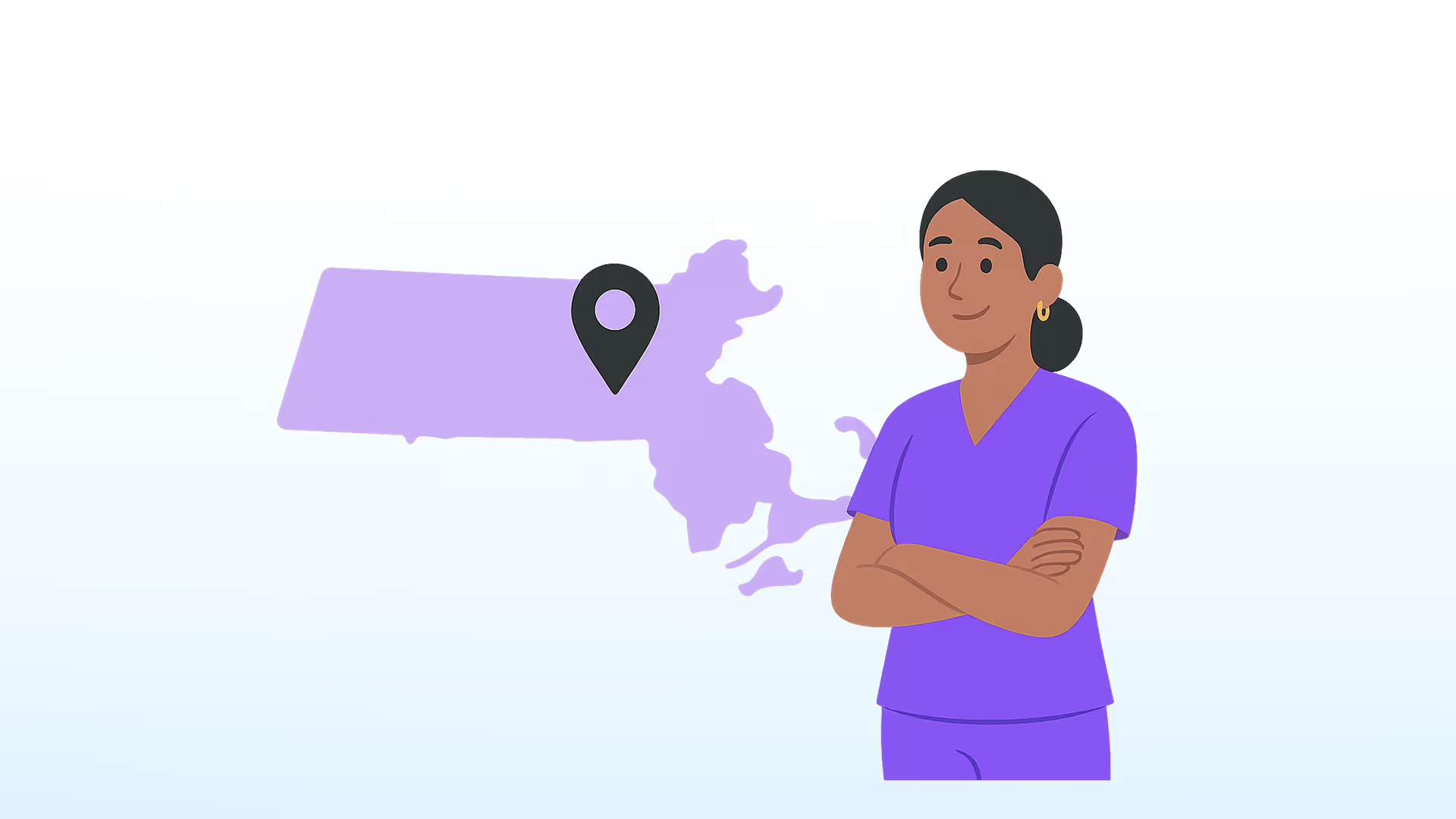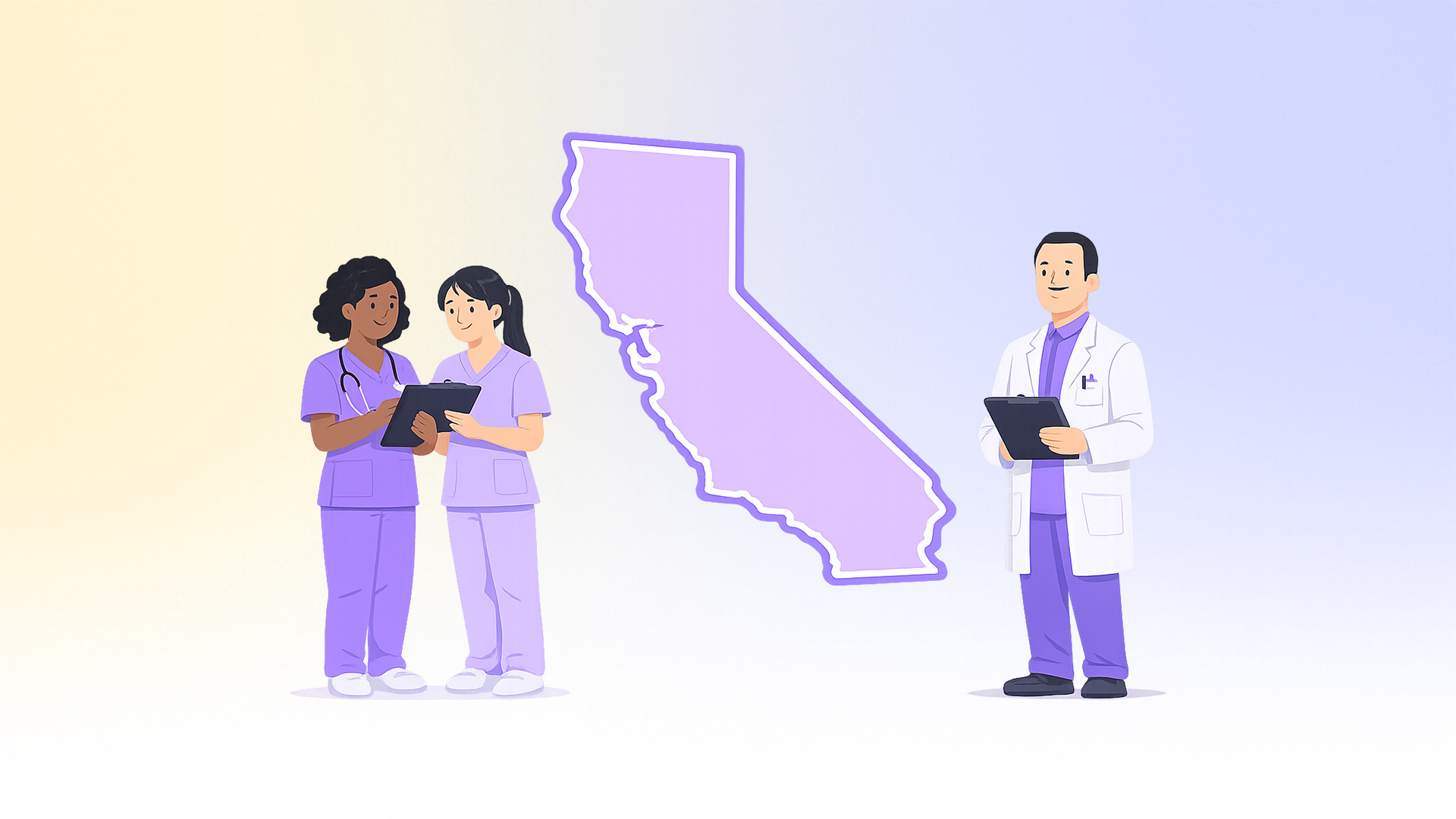Finding clinical rotations in Boston as an NP student requires a proactive, multi-channel approach that includes university support, outreach to local clinical sites, and use of preceptor directories or preceptor matching services. In this high-demand region, early planning and consistent follow-up are essential for securing the hands-on experience needed for graduation and licensure.
TLDR: Clinical Placements for NP Students in Boston
- Boston is one of the hardest cities for NP placements due to program oversaturation, exclusive hospital affiliations, and slow credentialing processes.
- University support helps—but isn’t enough. Schools like Simmons, UMass Boston, and MGH Institute offer placement assistance, but students still need to stay proactive.
- The DIY route costs more than time—expect to spend 100–200 hours searching, with risk of delays, lost income, and mounting stress.
- Resources outside your school can help, like BHCHP, Boston Medical Center, and the MCNP preceptors directory.
- NPHub offers a faster, managed solution for NP students who are unplaced, out-of-network, or running out of time.
Why clinical placements are so hard to find in Boston
Securing a clinical placement has become one of the biggest challenges for NP students especially in high-demand cities like Boston.
With a growing number of nursing students entering NP programs and a limited pool of available preceptors, many students are left scrambling to find clinical sites that meet their training requirements. The result? Delayed semesters, stalled graduation timelines, and overwhelming stress.
For NP students clinical rotations in specialties like primary care, women’s health, pediatrics, and critical care are in short supply. Understanding the preceptor search process, knowing how to access tools like NP preceptor finders or preceptors directories, and learning how to connect with experienced preceptors early on can make or break your clinical training experience.
Why Boston is one of the hardest cities for NP Students
Boston might be one of the best places to study healthcare, but when it comes to securing clinical placements, it’s a different story. Nurse practitioner students across the Boston area—and especially those in online or out-of-state programs—often find themselves hitting wall after wall in the preceptorship process. The city’s reputation as a healthcare and education hub is exactly what makes it so competitive.
First, there’s the sheer number of NP students. Boston is home to a high concentration of NP programs and doctoral-level nursing schools. With each program graduating dozens (if not hundreds) of students each year, preceptors are inundated with placement requests. This oversaturation of students has led to a serious bottleneck at many clinical sites, particularly in high-demand areas like primary care, women’s health, and pediatrics.
Then there’s the issue of access. Most major hospitals and academic medical centers in Boston—like Massachusetts General, Brigham and Women’s, and Boston Children’s—have exclusive partnerships with specific schools. These affiliation agreements are designed to support internal students first, which means students from unaffiliated or online NP programs often aren’t even considered, no matter how qualified they are.
Even when a preceptor is open to taking on a student, the process can stall. Credentialing paperwork, proof of liability insurance, onboarding modules, and site approval forms can take weeks—or months—to complete. Without a clinical placement coordinator managing the back-and-forth between school and site, these delays can derail an otherwise promising preceptorship offering, sometimes causing students to postpone an entire semester of training.
In a city like Boston, finding a placement isn’t just about availability—it’s about timing, relationships, and navigating a system built for students already in the loop. For NP students looking to break through, the odds are challenging—but not impossible.
How Boston universities support NP students with their clinical placements?
While Boston can be a though city for NP students to secure clinical placements, universities have recognized the challenge and stepped in with structured support systems to help. If you're enrolled in a Boston-based NP program, there’s a good chance your school offers tools and people to make the search for preceptors a little less overwhelming, especially in high-demand specialties like primary care, pediatrics, and women’s health.
What kind of support do universities offer?
Here’s what many schools provide to help you navigate your clinical rotations:
- A clinical placement coordinator who helps match you with available preceptors or guides you through the search
- Access to pre-approved clinical sites through long-standing partnerships with affiliated institutions
- Online tools to track your placement progress, upload documents, and get real-time notifications about new preceptors
- Help handling paperwork—like credentialing, onboarding, and school-site agreements
- Guidance on using the school’s own preceptor listings or tapping into broader resources like the Massachusetts Coalition
Some Boston universities really stand out when it comes to placement support:
- Simmons University gives each NP student a dedicated placement coordinator who helps secure rotations with local clinics, hospitals, and even private practices
- UMass Boston uses a digital platform to manage everything from preceptor approvals to deadlines—making it easier to keep things moving on time
- MGH Institute has partnerships with over 600 healthcare providers, giving students a wide range of options for building real-world experience across specialties
Why students still need to stay involved
Even if your school offers help, you’re not totally off the hook. Here’s what you’ll still need to do:
- Keep in touch with your coordinator so nothing falls through the cracks
- Be clear about your interests—like if you’re looking for rotations in family practice, women’s health, or critical care
- Be ready to message preceptors directly when needed or follow up after outreach
- Check your email (yes, really) for preceptor notifications or placement updates
- Use your school's tools, but also browse preceptors directories or ask clinical instructors and professors if they have recommendations
Your school might open the first few doors, but they can’t walk through them for you. That part’s yours. It’s your follow-up emails, your persistence, your ability to stay focused when it feels impossible—that’s what gets you across the finish line. Because in the end, no one cares more about your future than you do.
Where to look beyond your school
If your school doesn’t offer placement help, or you’re in an online program, you’re not out of luck. There are clinical sites and organizations in Boston that actively work with NP students, including those from unaffiliated or out-of-state programs. You just need to know where to look and how to approach them.
Boston Health Care for the Homeless Program (BHCHP)
This isn’t just a rotation—it’s a mission. BHCHP offers clinical experience in shelters, clinics, and outreach centers across the city. Students gain exposure to patients from diverse backgrounds and see healthcare through a public health lens. You’ll need your school to set up the affiliation, but BHCHP regularly works with nursing students and NP programs to make it happen.
Boston Medical Center (BMC)
BMC is one of the most accessible teaching hospitals in the city for NP students—especially in high-demand areas like family medicine, pediatrics, and women’s health. They offer clinical training in outpatient clinics and hospital settings. Most placements go through schools, but if yours doesn’t already have a relationship, a clinical placement coordinator may be able to start the process.
Massachusetts Coalition of Nurse Practitioners (MCNP)
This is your preceptor-finding cheat code. MCNP offers a student-seeking preceptors directory with real-time access to relevant preceptors across specialties and locations. You can search by city, specialty, or availability—and many listings include permission to directly message preceptors. A student membership gives you full access and is one of the most useful investments you can make.
These aren’t your only options, but they’re some of the best starting points if you’re trying to build a clinical rotation plan outside of school support. Just remember: preceptors searching for students are often doing so quietly. You won’t find them unless you’re looking in the right places.
What it really costs to go the DIY route?
Let’s be honest, most NP students don’t start their clinical placement journey planning to pay for help. And we get it. You figure if you do the work, send the emails, make the calls, something will come through. Maybe you even heard a classmate got a placement by cold-emailing a clinic, so you think, “I can do this too.”
But what no one tells you is that DIY comes with a cost and not just in time.
Time you don’t have
Most students spend anywhere from 100 to 200 hours trying to find a preceptor. That’s time researching clinical sites, sending follow-up emails, messaging preceptors, calling offices that never pick up, and redoing paperwork after waiting three weeks with no reply. All while managing classes, jobs, kids, and, you know, life. If your time is worth even $25/hour, that’s $2,500 to $5,000 in lost value—on top of the mental exhaustion.
Delays that hurt more than your schedule
Here’s the real gut punch: if you can’t secure your clinical placement in time, you may have to delay your rotation. And that delay can mean:
- Paying for an extra semester of your NP program
- Pushing back your graduation date by 3–6 months
- Missing out on job opportunities in family practice, women’s health, or pediatrics
- Paying more loan interest
- Losing income you would’ve earned as a licensed NP
That’s thousands of dollars—and even more frustration.
Stress that builds over time
The worst part? You’re doing everything right—emailing, calling, even using a preceptors directory—and still hearing nothing. You start doubting yourself, dreading your inbox, and wondering if you’re the only one not placed (you’re not).
If you’re juggling an accelerated program, caring for your family, or switching careers, the emotional toll of a failed placement search can be brutal. And for students without a clinical placement coordinator or school support system, it often feels like no one’s in your corner.

You can absolutely find a preceptor yourself—and for some students, it works out. But if the clock is ticking, your inbox is full of dead ends, or you’ve run out of leads, it’s time to stop spinning your wheels.
Because getting placed isn’t just about checking a box. It’s about getting the clinical experience, hands-on training, and real-world patient care you need to actually feel ready as a nurse practitioner.
And that’s where NPHub steps in. Ready? Let’s talk about it.
How NPHub helps NP students get placed in Boston
If you're reaching the point where emails aren’t working, your clinical instructors are out of leads, and your semester deadline is creeping closer—this is the part where you stop stressing alone. Because there’s an option that actually works: NPHub.
We’re not just another listing site. NPHub is built specifically for nurse practitioner students, by people who understand what it’s like to juggle coursework, family, and a broken preceptor search system. We don’t sell you hope—we help you secure the clinical placement you need to graduate on time.
What makes NPHub different
- We find relevant preceptors in the Boston area
Our team connects you with experienced preceptors across high-demand specialties like primary care, pediatrics, women’s health, and critical care. Whether you need a private practice or a community clinic, we help you match based on your specialty, availability, and school requirements. - We manage the paperwork and approvals
We work with your school and the clinical site to make sure all the credentialing, affiliation agreements, and preceptor requirements are handled. You won’t spend weeks chasing signatures—we’ve got it. - We offer guaranteed placements
If we can’t find a placement for you, you don’t pay. It’s that simple. - We move quickly—because we know you need this now
Most students are placed within 2–4 weeks. If you're nearing your rotation date and still unplaced, we can help you get across the finish line without sacrificing your education or peace of mind.
When using a service like NPHub makes sense
- You’re weeks away from a required clinical and still unplaced
- Your NP program doesn’t offer placement help
- You’ve exhausted your network and aren’t getting replies from preceptor listings
- You’re in a doctoral program or fast-track semester and can’t afford to delay
- You’re just tired of doing it all yourself
Because at the end of the day, your job isn’t just to find a preceptor it’s to become a nurse practitioner. NPHub is here to help you do that without unnecessary delays, burnout, or tuition setbacks.
Guess what... you don’t have to figure this out alone
If you’re feeling stuck, you’re not behind, you’re just in Boston. And yes, it’s hard here. The clinical placement system isn’t designed for flexibility, and it’s certainly not built with online students, second-career nurses, or working parents in mind. But you’ve come this far, and you’re not without options.
You can tap into your NP program’s support, reach out to clinical sites like BHCHP or BMC, search through preceptors directories, or join the Massachusetts Coalition to find relevant preceptors. You can keep messaging, keep following up, and keep pushing.
Or, when you're done doing it alone, you can use a service that meets you halfway.
Because this isn’t just about checking a box on your degree. It’s about building clinical experience, gaining confidence in your patient care, and stepping into the kind of nurse practitioner you want to be. Whether you’re in family practice, women’s health, pediatrics, or critical care, the training you get now shapes your future.
So if you're tired of wondering how you’ll find a placement in time, or how you’ll keep up while you try, know this: support exists. The help is real. And the finish line is closer than it feels.
Let’s get you placed. Learn more about NPHub’s Boston placement support or connect with our team today.
Frequently Asked Questions
1. What are the best places to get NP clinical placements in Boston?
Some of the top clinical sites that accept NP students include Boston Medical Center (BMC), Boston Health Care for the Homeless Program (BHCHP), and organizations listed in the Massachusetts Coalition of Nurse Practitioners (MCNP) preceptors directory. These sites offer diverse clinical experience in high-demand areas like family practice, women’s health, and pediatrics.
2. Do Boston universities help NP students find preceptors?
Yes—many do. Schools like Simmons, UMass Boston, and MGH Institute provide support through clinical placement coordinators, affiliated institutions, and digital tools to help students track and complete their clinical rotations. The level of support can vary by program.
3. What should I do if I haven’t heard back from any preceptors I contacted?
First—don’t panic. It’s common for NP students to send dozens of messages before getting a response. Give it a week, then follow up politely. If you still don’t hear back, shift strategies: reach out to your clinical placement coordinator (if you have one), check updated preceptor listings, or consider using a placement service to avoid delays.
4. What if my school doesn’t help me find a preceptor?
If you're in an online or out-of-state NP program, you may be expected to manage your own preceptor search. In that case, tools like preceptor directories, NP preceptor finders, and student-seeking preceptors listings can help—but many students also turn to matching services when timelines get tight.
5. When should I start looking for clinical placements in Boston?
Start at least 4–6 months in advance—more if you’re looking for competitive specialties like pediatrics or critical care. Preceptor availability in Boston shifts quickly, and early outreach increases your chances of success.
6. What’s the average time it takes to secure a placement on your own?
Most NP students spend 2 to 6 months searching for a preceptor independently. Factors like location, specialty, and school affiliation can speed up or slow down the process.
7. Is it better to use a school placement system or go independent?
If your school offers a placement coordinator or affiliated clinical sites, use them. These relationships simplify paperwork and reduce the risk of delay. But if you're stuck, placement services can help you find a perfect preceptor without starting from scratch.
8. How much does it cost to use a placement service like NPHub in Boston?
Most NP preceptor placement services charge between $1,500 and $2,500 per rotation, depending on specialty and urgency. While that’s an upfront cost, it often prevents much larger financial losses from delayed semesters or extended NP programs.
Key definitions
- Clinical placement
A required, supervised rotation where NP students apply classroom learning in real patient care settings, often across multiple specialties. - Clinical rotation
The hands-on period of clinical training spent at a healthcare site under the supervision of a licensed provider (your preceptor). - NP preceptor
A nurse practitioner who specifically takes on the role of mentoring NP students during their clinical placements. - Preceptors directory
A searchable list or database of available preceptors, often organized by specialty, location, and availability. - Clinical placement coordinator
A school-based advisor who helps manage the logistics of student rotations, including site matching, paperwork, and deadlines. - Affiliated institutions
Hospitals, clinics, or private practices that have formal agreements with universities to accept their students for clinical training.
About the author
- NPHub Staff
At NPHub, we live and breathe clinical placements. Our team is made up of nurse practitioners, clinical coordinators, placement advisors, and former students who’ve been through the process themselves. We work directly with NP students across the country to help them secure high-quality preceptorships and graduate on time with confidence. - Last updated
May 15, 2025 - Fact-checked by
NPHub Clinical Placement Experts & Student Support Team - Sources and references
Find a preceptor who cares with NPHub
Book a rotation.webp)








.webp)


.webp)
.png)
.png)

%20(3)%20(2).svg)
.webp)